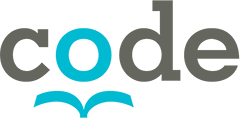(The following article was originally published in the Fall 2021 edition of Diplomat and International Canada Magazine:)
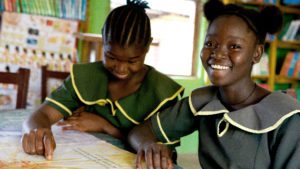
Grace hunches over her desk to write – watching her, it seems that she’s trying to hide her size and blend into the sea of much younger and smaller children around her. She’s 16 and sitting in a grade 1 classroom in rural Liberia. If you were to flip through her notebook you would be impressed by her penmanship. She has mastered the art of copying notes from the chipped chalkboard. Grace shows up every day, conquering her shame and determined to learn.
So, what’s holding her back?
She can’t read.
In sub-Saharan Africa alone, 88% or 202 million children are not meeting minimum proficiency levels in literacy. Amongst over-age students – those whose learning is truncated by late entry into the school system and early departure during adolescence – the rate is often higher. This example of Learning Poverty, as defined by the World Bank and UNESCO, is the inability to read and understand a simple text by age 10. Learning Poverty has catastrophic downstream impacts on children like Grace.
The ability to read is a foundational stepping-stone, a gateway skill, that allows students to progress successfully through school, and to realize their potential as literate, empowered and self-reliant citizens. Conversely, if children can’t read by age 10 or at least by the end of primary school, they are likely to never learn to read in later years.
Over-age girls like Grace have the odds stacked against them. They suffer under the weight of compounding pressures and multiple barriers to success. A late start in school finds them in over-crowded and desperately under-resourced classrooms where teachers often lack the skill to cater to their unique pedagogical needs. A lack of parental support; feelings of low self-worth; low family literacy; and mounting social pressures push girls into unwanted sexual activity, teen pregnancy, early marriages and into the labor market to support their families. Unless something changes, girls like Grace quickly drop out and are relegated to a life of poverty.
As in other post-conflict countries, in Liberia, over-age enrolment remains a civil war legacy. But there are other persistent economic and social challenges that contribute to the high prevalence of children getting a later start in school. For girls, in particular, this includes a disproportionate burden of care for younger siblings and household chores, as well as safety concerns when girls need to travel a long distance to school.
Over-age enrolment in Liberia is the highest in sub-Saharan Africa with 74% of students (both girls and boys) too old for their grade. And although the incidence of over-age enrolment is nearly the same for boys and girls, girls face a greater risk of dropping out sooner for the many reasons noted above.
Over-age girls need to advance quickly if they are to have a fighting chance at completing primary school and successfully transitioning into higher levels of education. And that is precisely what the Girls’ Accelerated Learning Initiative (GALI) aims to do.
The program, established by CODE (an Ottawa-based international development organization) and its local partner, the WE-CARE Foundation in Monrovia, aims to give girls like Grace an academic lifeline.
The program presently provides 383 over-age girls at 25 primary schools in Bomi, Margibi and Montserrado counties in Liberia with daily afterschool small-group tutoring to accelerate their learning and equip them with valuable life-skills. Through the program and the girls’ hard work, girls are quickly and confidently advanced to more age-appropriate grades.
Each of 75 specially trained teachers receive a modest stipend to work closely with a group of five over-age girls over the course of the academic year. They focus on mastery of foundational literacy and numeracy skills and provide remedial support for learning in other subject areas as well. Given that participating girls tend to be 12-16 years old and in grades 1-3 when they enter the program, inclusion of gender-specific topics like menstrual hygiene management and gender equality are also a critical element of the program.
GALI was first piloted in five schools in 2017 at the behest of the WE-CARE Foundation. The high demand and exceptional potential were quickly recognized, and the following year GALI was expanded to an additional 20 schools with support from Montreal-based 60 million girls Foundation.
Over the past 4 years, the program has been refined and adapted with feedback from teachers, students and other local stakeholders. Attendance challenges have been minimized through enhanced parental engagement, introduction of snacks and sanitary pads, while professional development for GALI teachers, introduction of more girl-centric learning materials and mobile learning labs have created environments where girls are thriving.
In CODE’s most recent GALI cohort, 77% of girls were promoted two grade levels in a single year and 22% were promoted one grade. The latter may seem “normal,” however, many would have dropped out or been held back without the additional support. While statistics provide a good measure of success, it’s in the stories and voices of participating girls that we truly see and feel the far-reaching impacts of this modest program. So, we are delighted to introduce you to three current GALI girls.
Profile - MARY (age 15)
Shifting the Norm
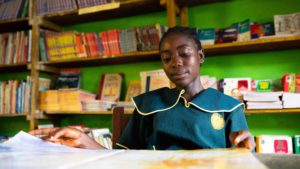 “If you don’t go to school, you will not eat….” threatens Mary’s mother in a stern voice when Mary drags her heels in the morning.
“If you don’t go to school, you will not eat….” threatens Mary’s mother in a stern voice when Mary drags her heels in the morning.
This kind of parental “encouragement” for girls to attend school is often still the exception rather than the rule. As in much of the Global South, in Liberia, pervasive cultural norms diminish the perceived value of educating girls. Amongst her siblings, Mary is the only one presently attending school.
While primary education in public schools is free in Liberia, the costs of uniforms, school supplies, and transportation can be prohibitive and force families to make difficult choices.
Perhaps traditional cultural norms would have dictated that one of Mary’s brothers be given the opportunity but seeing Mary’s rapid promotion from grade 2 (where she sat until age 14) to grade 4 over the course of one academic year has Mary’s mother convinced that her education is worth supporting.
GALI demands significant awareness-raising among parents and community members culminating in formal permission being granted for their daughters to participate in the after-school programming.
Without parental support and permission, attendance in the after-school program would be very erratic or start off strong and then taper off as the year goes on. Girls are in high demand after school to help with chores and income generation, and allowing them to stay at school longer is no small commitment for these families.
An interesting and notable driver of parental interest in GALI has been the introduction of mobile learning labs into the program at select schools, which gives the girls access to a carefully curated assortment of high-quality books, videos and games through a solar-powered RACHEL-Plus wireless server and tablets. The digital divide is significant in Liberia, and yet there is recognition amongst many parents that familiarity with technology provides a significant advantage to their girls.
For Mary’s part, she required no convincing to take part in GALI, she describes herself as “happy” for having been selected, and says that the program has helped her “feel good about herself.”
The friendships she has struck with the other four girls in her GALI pod are the sorts that are bound to last a lifetime. The girls open-up during their life-skills lessons about difficult subjects like puberty and sexual health, and turn to each other for academic support.
It’s this camaraderie and the safe space that GALI creates that help the girls not only thrive in their studies but also gain a sense of empowerment that helps them challenge norms and assert their rights now and well into the future.
Profile: SARAH (age 14)
Defying the Odds
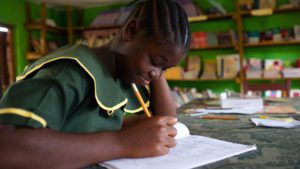 Sarah confidently strode out of the classroom where she had just concluded sitting for the Liberia Primary School Certificate Examination, which tests knowledge of science, language arts, social studies, and mathematics.
Sarah confidently strode out of the classroom where she had just concluded sitting for the Liberia Primary School Certificate Examination, which tests knowledge of science, language arts, social studies, and mathematics.
The sun was shining brightly, reflecting her buoyant spirits. “I know I passed!” she declared to Yvonne Weah, Program Director with the WE-CARE Foundation.
If Sarah’s prediction is true – which we have every confidence it is – she will begin the new academic year in November as a seventh grader in Junior High School. In the time that we’ve known Sarah, she has come a very long way academically and just as importantly in her feelings of confidence and self-worth.
When Sarah first joined GALI in 2017, she was a 10 year-old sitting in a grade one classroom. Having already repeated grade one twice before, Sarah was struggling to learn and to advance. With her parents not seeing the “return” on their decision to enroll Sarah in school, her days in the classroom were most likely numbered.
Through GALI’s small-group tutoring, Sarah’s learning accelerated and double promotions over a two-year period got her comfortably into grade five. And although she exited the academic portion of the program at that time, making way for other over-age girls awaiting the opportunity, she continued to participate in the “Friday Sessions” focused on sexual health and life-skills development.
Underlying Sarah’s success story was her mastery of foundational literacy skills, which opened the gateway to learning in all other subject areas. Sarah explains in her own words, “I was very excited [to join GALI] because I knew that it was going to benefit me in the future. Knowing how to read and write…can further my understanding of lessons.”
Literacy is about mastering the basics – ABCs, letter sounds, decoding and word recognition – but it goes well beyond that to include fluency, comprehension and critical thinking. The teachers that CODE trains to facilitate GALI focus on developing the entire spectrum of literacy skills, thereby helping to nurture girls to become problem solvers and eager learners.
With only 32% of girls transitioning to Junior High School in Liberia (and only 11% of girls from the poorest households), Sarah is already defying the odds. While GALI has helped to nurture her academic success, it’s Sarah’s intrinsic motivation, conscientious work ethic and light-hearted sense of humor that will get her further than she may ever have dared to hope.
BLESSING (age 14)
Determined to Learn
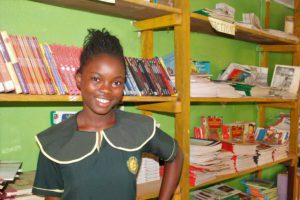 Blessing grew up living with her mother “in the interior” – a rural area where she wasn’t given the chance to go to school. At age 12, her father brought her to the city and enrolled Blessing in school for the first time at age 12. Despite her late start, Blessing is determined to follow in the footsteps of her older sisters both of whom are currently in high school.
Blessing grew up living with her mother “in the interior” – a rural area where she wasn’t given the chance to go to school. At age 12, her father brought her to the city and enrolled Blessing in school for the first time at age 12. Despite her late start, Blessing is determined to follow in the footsteps of her older sisters both of whom are currently in high school.
Blessing was selected to participate in GALI one year ago (fall 2020), and has since advanced two grade levels. It hasn’t been an easy road as schools in Liberia remained closed due to the pandemic between September and December 2020, and upon reopening introduced a condensed school year including weekend classes.
It’s well documented that girls are disproportionately impacted by large-scale disruptions to schooling, whether civil unrest or health-related emergencies. After the Ebola crisis in 2015, for instance, the percentage of out-of-school girls in Liberia rose from 8% to 21%. To help prevent learning loss but also to maximize their chances of returning to school, CODE adapted the GALI program to encourage girls to keep learn at home.
Between September and December 2020, CODE and WE-CARE Foundation distributed monthly at-home learning kits to GALI participants containing reading books, academic workbooks with grade-specific content for language arts, math, science and social studies, as well as stationery and hygiene supplies (including hand sanitizer and face masks).
Along with the kits, GALI teachers established contact where possible with the 5 girls in their respective GALI pods, and regularly checked in to provide help with self-study. Despite the additional supports, 19% of GALI participants did not return when school reopened – demonstrating just how significant the challenge is.
Although Blessing’s parents are illiterate, she received support from her siblings in completing her at-home study activities, and returned to school without delay in January 2021. With the resumption of GALI, her grades improved dramatically – from failing in all subjects to meeting the 80% minimum requirement for accelerated promotion. Midway through the year she was promoted to grade 3 and then to grade 4 at year-end.
In November, with the start of the new academic year, Blessing will find herself sitting proudly in a grade 4 classroom. While she credits her GALI teacher, Ms. Watson’s, careful explanations for much of her success in mastering both fundamental literacy and numeracy skills over the past year, she notes it’s the math games available on the mobile learning lab tablets that have injected a dose of fun and excitement into her learning.
Blessing will have an opportunity to continue diving into the wealth of interactive content available on the tablets, as well as benefit from Ms. Watson’s tutelage over the coming year. We hope for her sake and that of all students that the school year ahead will be far less tumultuous than last year’s.
Conclusion
In 1992, then Chief Economist at the World Bank, Lawrence Summers said, “Investment in girls’ education may well be the highest return investment available in the developing world.” Although much time has passed, this statement rings as true today as it did when it was first made.
Great strides have been taken globally in advancing girls’ education, and the momentum continues to build. Earlier this year at the G7 in Cornwall, world leaders defined two new global goals for girls’ education, one of which is “20 million more girls reading by age 10 or by the end of primary school by 2026.” Significant funding commitments followed from both donor and national governments through the Global Partnership for Education’s Global Education Summit.
Meanwhile, within the framework for the UN’s Sustainable Development Goals, and with careful consideration of national education priorities, organizations like CODE and the WE-CARE Foundation continue to do their part.
Over the past three years, the Girls’ Accelerated Learning Initiative (GALI) has demonstrated that remedial lessons and life-skills development opportunities for over-aged girl students need not be difficult or expensive to make a positive impact.
For girls like Blessing, Sarah and Mary, GALI has been an educational lifeline that has set them on a solid track toward primary school completion and transition into higher grades. But beyond the immediate benefits, we know that investments in girls’ education creates a virtuous circle over time: the children of literate mothers are more than twice as likely to go to school themselves. By supporting this generation of girls, we are also supporting the next through compounding benefits in education, health and economic prosperity.
To learn more, visit code.ngo/gali
Claire Wanjiru is a former Program Manager at CODE. Born and raised in Kenya, Claire moved to Canada a decade ago to earn her M.A. in Globalization and International Development from the University of Ottawa. She is a proud mom of two toddler boys and wife to the best man this world could offer, Fidele.

